16 may 2019
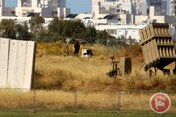
The Israeli army deployed its Iron Dome aerial defense system batteries throughout the country, on Thursday, as the Eurovision song contest kicked off earlier this week.
The Iron Dome batteries were deployed around Israel, specifically in southern Israel as Eurovision’s semi-finals kicked off on Tuesday May 14th and will hold its finals on Saturday May 18th.
The Hamas movement and the Palestinian Islamic Jihad movement warned Israel against any possible attacks during the Eurovision song contest.
According to Haaretz news outlet, Israeli army reservists have been activated to man the Iron Dome and will remain during Eurovision.
The Iron Dome batteries were deployed around Israel, specifically in southern Israel as Eurovision’s semi-finals kicked off on Tuesday May 14th and will hold its finals on Saturday May 18th.
The Hamas movement and the Palestinian Islamic Jihad movement warned Israel against any possible attacks during the Eurovision song contest.
According to Haaretz news outlet, Israeli army reservists have been activated to man the Iron Dome and will remain during Eurovision.
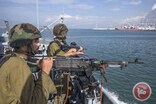
Israeli authorities have decided to drastically reduce the permitted fishing zone off Gaza’s coast "until further notice," on Thursday.
Head of the Palestinian Fishermen Union in Gaza, Zakariya Bakr, told Ma'an that Israeli authorities reduced the permitted fishing zone from 12 nautical miles to only five.
Bakr said that the Israeli naval forces prevented Palestinian fishermen from retrieving their fishing nets seven nautical miles off Gaza’s coast.
Bakr also pointed out that the Israeli navy opened heavy fire at fishermen who attempted to pass the five nautical miles, forcing them to sail back to shore in fear for their lives.
Israeli practices undermined the fishermen’s ability to make a living at sea.
It is noteworthy that only six days ago, Israeli authorities allowed the expansion of the permitted fishing zone to 12 nautical miles.
Palestinian fishermen, who try to make a living off the shores of the blockaded coastal enclave face daily risks, including routine harassment from Israeli naval forces, confiscation of boats and materials, detention and live fire.
According to the United Nations Office for Humanitarian Affairs (OCHA), in 1994, a permitted fishing range of 20 nautical miles was agreed on between Israel and the Palestinian Liberation Organization (PLO). In practice, Israel only allowed fishing up to 12 nautical miles until 2006, when the fishing zone was reduced to six and later to three.
Head of the Palestinian Fishermen Union in Gaza, Zakariya Bakr, told Ma'an that Israeli authorities reduced the permitted fishing zone from 12 nautical miles to only five.
Bakr said that the Israeli naval forces prevented Palestinian fishermen from retrieving their fishing nets seven nautical miles off Gaza’s coast.
Bakr also pointed out that the Israeli navy opened heavy fire at fishermen who attempted to pass the five nautical miles, forcing them to sail back to shore in fear for their lives.
Israeli practices undermined the fishermen’s ability to make a living at sea.
It is noteworthy that only six days ago, Israeli authorities allowed the expansion of the permitted fishing zone to 12 nautical miles.
Palestinian fishermen, who try to make a living off the shores of the blockaded coastal enclave face daily risks, including routine harassment from Israeli naval forces, confiscation of boats and materials, detention and live fire.
According to the United Nations Office for Humanitarian Affairs (OCHA), in 1994, a permitted fishing range of 20 nautical miles was agreed on between Israel and the Palestinian Liberation Organization (PLO). In practice, Israel only allowed fishing up to 12 nautical miles until 2006, when the fishing zone was reduced to six and later to three.
15 may 2019

On May 4, Israel launched a series of deadly airstrikes on the besieged Gaza Strip, prompting a response from various resistance groups. At least 25 Palestinians were killed and nearly 200 people wounded in the Israeli attacks. Four Israelis were also killed by Palestinian rockets.
The clashes were instigated by Israel, when the Israeli military killed four Palestinians in Gaza on May 3. Two were killed while protesting along the fence separating Gaza from Israel. They were participating in the Great March of Return, a protracted Palestinian non-violent protest demanding an end to the Israeli siege. The other two were killed in an Israeli airstrike that targeted a Hamas post in the central Gaza Strip.
Why did Netanyahu choose such timing to bomb Gaza? It would have made more sense to attack Gaza in the run-up to the general elections. For months before the April 9 elections, Netanyahu was repeatedly accused of being soft on Hamas.
Although desperate for votes, Netanyahu refrained from a major operation against Gaza, because of the inherent risk in such attacks, as seen in the botched Israeli incursion into Khan Younis on November 11. Netanyahu could have lost a highly contested election, had he failed.
Following a victory, the soon-to-be longest-serving Israeli Prime Minister has the necessary political capital to launch wars at whim.
Israeli politics featured heavily in the latest Gaza onslaught.
Netanyahu is in the final stages of forming a new coalition, yet another government of the like-minded far right, religious zealots and ultra-nationalist politicians which, he admits, is not easy.
“It’s not a simple job, and there are different aspects – giving out portfolios, control over the state budget and many other challenges,” Netanyahu said at a Likud party meeting on April 30.
If Netanyahu succeeds, he will form his fifth government – 4 of them consecutively. However, his main challenge is to reconcile among the various potential coalition partners.
Netanyahu wishes to include six parties in his new government: his own, the Likud, with 35 seats in the Israeli Knesset (parliament); religious extremist parties: Shas (8 places), United Torah Judaism (8), Yisrael Beiteinu of ultra-nationalist, Avigdor Lieberman (5), the newly-formed Union of Right-wing Parties (5) and the centrist Kulanu with 4 seats.
“Netanyahu is keen to include all six parties in his government to provide a semblance of stability and prevent a narrow majority that will be at the mercy of a single disgruntled party threatening to quit,” reported the Israeli daily Jerusalem Post newspaper.
But how is Netanyahu to maintain peace among vastly different allies and how is that relevant to the bombing of Gaza?
Netanyahu bombed Gaza because it is the only unifying demand among all of his allies. He needed to assure them of his commitment to keeping the pressure on Palestinian Resistance, of maintaining the siege on Gaza and ensuring the safety of Israel’s southern towns and settlements.
Barring that, there is little that these groups have in common. Lieberman’s Yisrael Beiteinu and the ultra-Orthodox parties barely agree on some fundamental issues. For example, Lieberman has been pushing for a draft law requiring ultra-Orthodox conscription in the Israeli army, vehemently rejected by Netanyahu’s religious allies.
Although the election performance of Lieberman’s party was hardly impressive, his influence goes beyond numbers. Lieberman had resigned his post as a Defense Minister last November in protest of Netanyahu’s supposed “capitulation to terror”, but he has formed a strong alliance with Israel’s southern towns bordering the besieged Gaza Strip.
For years, Lieberman has expressed solidarity with them and, in return, has manipulated this whenever he wishes to pressure or challenge the Prime Minister.
Lieberman has exploited the notion among residents and settlers in southern Israel and the Occupied West Bank that they are being mistreated compared to their compatriots elsewhere.
Following a truce between Israel and Gaza factions last November, for example, hundreds of settlers protested their “second class status”, demanding greater government support to protect their “security” against Gaza. Interestingly, these border towns have been at the center of a significant economic and demographic growth over the last few years, which has been stimulated by the Israeli government’s investments in the area.
Seeing themselves as the heirs to the Zionist founders of Israel, residents of these towns believe that they are the defenders of the Zionist vision.
Despite their continuous complaints, southern Israeli communities have seen constant growth in economic opportunity, thus population. This fact has placed these areas at the center of Israeli politicians’ radar, all trying to win favor with their leaders and obtain the support of their vastly expanding economic sectors.
This recent electoral strength has made the demands and expectations of Israeli southern community leaders a focal point in mainstream Israeli politics.
Therefore, it is unsurprising that one of the conditions placed by Lieberman to join Netanyahu’s coalition is the intensification of the Israeli siege on Gaza and the liquidation of the Gaza resistance.
Although Benny Gantz, the leader of the centrist Blue and White Party, has lost the elections, he wishes to stay relevant in mainstream politics by appealing to Jewish settlers and residents of southern Israel. During the Israeli army’s attack on Gaza on 4 May, Gantz joined the chorus calling for more Palestinian blood.
“We must strike hard, in an uncompromising manner, in any way the army will recommend, with military and intelligence considerations,” he told Israeli Channel 13. “We must restore the deterrence that has been eroded catastrophically for more than a year.”
Following the death of 4 Israelis as a result of Gaza rockets, Israeli politicians jockeyed to show support for southern residents, demanding yet more violence. The euphoria of support inspired the mayor of Sderot, Alon Davidi, to call for the invasion of Gaza.
The latest attack on Gaza was meant to serve the interests of all of Netanyahu’s possible coalition partners. Alas, although a truce has been declared, more Israeli violence should be expected once the coalition is formed because, for Netanyahu to keep his partners happy, he would need to keep pounding Gaza persistently.
– Ramzy Baroud is a journalist, author and editor of Palestine Chronicle. His last book is ‘The Last Earth: A Palestinian Story'. Baroud has a Ph.D. in Palestine Studies from the University of Exeter and was a Non-Resident Scholar at Orfalea Center for Global and International Studies, University of California Santa Barbara.
The clashes were instigated by Israel, when the Israeli military killed four Palestinians in Gaza on May 3. Two were killed while protesting along the fence separating Gaza from Israel. They were participating in the Great March of Return, a protracted Palestinian non-violent protest demanding an end to the Israeli siege. The other two were killed in an Israeli airstrike that targeted a Hamas post in the central Gaza Strip.
Why did Netanyahu choose such timing to bomb Gaza? It would have made more sense to attack Gaza in the run-up to the general elections. For months before the April 9 elections, Netanyahu was repeatedly accused of being soft on Hamas.
Although desperate for votes, Netanyahu refrained from a major operation against Gaza, because of the inherent risk in such attacks, as seen in the botched Israeli incursion into Khan Younis on November 11. Netanyahu could have lost a highly contested election, had he failed.
Following a victory, the soon-to-be longest-serving Israeli Prime Minister has the necessary political capital to launch wars at whim.
Israeli politics featured heavily in the latest Gaza onslaught.
Netanyahu is in the final stages of forming a new coalition, yet another government of the like-minded far right, religious zealots and ultra-nationalist politicians which, he admits, is not easy.
“It’s not a simple job, and there are different aspects – giving out portfolios, control over the state budget and many other challenges,” Netanyahu said at a Likud party meeting on April 30.
If Netanyahu succeeds, he will form his fifth government – 4 of them consecutively. However, his main challenge is to reconcile among the various potential coalition partners.
Netanyahu wishes to include six parties in his new government: his own, the Likud, with 35 seats in the Israeli Knesset (parliament); religious extremist parties: Shas (8 places), United Torah Judaism (8), Yisrael Beiteinu of ultra-nationalist, Avigdor Lieberman (5), the newly-formed Union of Right-wing Parties (5) and the centrist Kulanu with 4 seats.
“Netanyahu is keen to include all six parties in his government to provide a semblance of stability and prevent a narrow majority that will be at the mercy of a single disgruntled party threatening to quit,” reported the Israeli daily Jerusalem Post newspaper.
But how is Netanyahu to maintain peace among vastly different allies and how is that relevant to the bombing of Gaza?
Netanyahu bombed Gaza because it is the only unifying demand among all of his allies. He needed to assure them of his commitment to keeping the pressure on Palestinian Resistance, of maintaining the siege on Gaza and ensuring the safety of Israel’s southern towns and settlements.
Barring that, there is little that these groups have in common. Lieberman’s Yisrael Beiteinu and the ultra-Orthodox parties barely agree on some fundamental issues. For example, Lieberman has been pushing for a draft law requiring ultra-Orthodox conscription in the Israeli army, vehemently rejected by Netanyahu’s religious allies.
Although the election performance of Lieberman’s party was hardly impressive, his influence goes beyond numbers. Lieberman had resigned his post as a Defense Minister last November in protest of Netanyahu’s supposed “capitulation to terror”, but he has formed a strong alliance with Israel’s southern towns bordering the besieged Gaza Strip.
For years, Lieberman has expressed solidarity with them and, in return, has manipulated this whenever he wishes to pressure or challenge the Prime Minister.
Lieberman has exploited the notion among residents and settlers in southern Israel and the Occupied West Bank that they are being mistreated compared to their compatriots elsewhere.
Following a truce between Israel and Gaza factions last November, for example, hundreds of settlers protested their “second class status”, demanding greater government support to protect their “security” against Gaza. Interestingly, these border towns have been at the center of a significant economic and demographic growth over the last few years, which has been stimulated by the Israeli government’s investments in the area.
Seeing themselves as the heirs to the Zionist founders of Israel, residents of these towns believe that they are the defenders of the Zionist vision.
Despite their continuous complaints, southern Israeli communities have seen constant growth in economic opportunity, thus population. This fact has placed these areas at the center of Israeli politicians’ radar, all trying to win favor with their leaders and obtain the support of their vastly expanding economic sectors.
This recent electoral strength has made the demands and expectations of Israeli southern community leaders a focal point in mainstream Israeli politics.
Therefore, it is unsurprising that one of the conditions placed by Lieberman to join Netanyahu’s coalition is the intensification of the Israeli siege on Gaza and the liquidation of the Gaza resistance.
Although Benny Gantz, the leader of the centrist Blue and White Party, has lost the elections, he wishes to stay relevant in mainstream politics by appealing to Jewish settlers and residents of southern Israel. During the Israeli army’s attack on Gaza on 4 May, Gantz joined the chorus calling for more Palestinian blood.
“We must strike hard, in an uncompromising manner, in any way the army will recommend, with military and intelligence considerations,” he told Israeli Channel 13. “We must restore the deterrence that has been eroded catastrophically for more than a year.”
Following the death of 4 Israelis as a result of Gaza rockets, Israeli politicians jockeyed to show support for southern residents, demanding yet more violence. The euphoria of support inspired the mayor of Sderot, Alon Davidi, to call for the invasion of Gaza.
The latest attack on Gaza was meant to serve the interests of all of Netanyahu’s possible coalition partners. Alas, although a truce has been declared, more Israeli violence should be expected once the coalition is formed because, for Netanyahu to keep his partners happy, he would need to keep pounding Gaza persistently.
– Ramzy Baroud is a journalist, author and editor of Palestine Chronicle. His last book is ‘The Last Earth: A Palestinian Story'. Baroud has a Ph.D. in Palestine Studies from the University of Exeter and was a Non-Resident Scholar at Orfalea Center for Global and International Studies, University of California Santa Barbara.
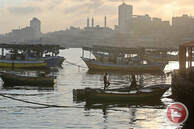
A Palestinian fisherman was shot and injured by Israeli naval forces while working off Gaza’s coast, on Wednesday.
The Palestinian Fishermen Union in Gaza told Ma'an that Mourad al-Hasi, 22, was shot and injured with a rubber-coated steel bullet fired by Israeli naval forces.
The union confirmed that the Israeli navy repeatedly opened heavy fire towards Palestinian fishermen within the permitted fishing zone of 12 nautical miles.
The fisherman's medical condition remained unknown.
It is noteworthy that last week Israeli authorities decided to expand the permitted fishing zone off Gaza’s coast to 12 nautical miles after the Israeli escalation during which the zone was drastically reduced.
As part of Israel's blockade of the coastal enclave since 2007, the Israeli army, citing security concerns, requires Palestinian fishermen to work within a limited "designated fishing zone," the exact limits of which are decided by the Israeli authorities and have historically fluctuated.
The Israeli army regularly detains and opens fire on unarmed Palestinian fishermen, shepherds, and farmers along the border areas if they approach the unilaterally declared buffer zone.
Israeli human rights group B'Tselem recently concluded that Israel's Gaza closure and "harassment of fishermen" have been "destroying Gaza's fishing sector," with 95% of fishermen living below the poverty line.
The Palestinian Fishermen Union in Gaza told Ma'an that Mourad al-Hasi, 22, was shot and injured with a rubber-coated steel bullet fired by Israeli naval forces.
The union confirmed that the Israeli navy repeatedly opened heavy fire towards Palestinian fishermen within the permitted fishing zone of 12 nautical miles.
The fisherman's medical condition remained unknown.
It is noteworthy that last week Israeli authorities decided to expand the permitted fishing zone off Gaza’s coast to 12 nautical miles after the Israeli escalation during which the zone was drastically reduced.
As part of Israel's blockade of the coastal enclave since 2007, the Israeli army, citing security concerns, requires Palestinian fishermen to work within a limited "designated fishing zone," the exact limits of which are decided by the Israeli authorities and have historically fluctuated.
The Israeli army regularly detains and opens fire on unarmed Palestinian fishermen, shepherds, and farmers along the border areas if they approach the unilaterally declared buffer zone.
Israeli human rights group B'Tselem recently concluded that Israel's Gaza closure and "harassment of fishermen" have been "destroying Gaza's fishing sector," with 95% of fishermen living below the poverty line.
14 may 2019
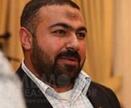
Former head of the Israeli National Security Council Yaakov Amidror was asked by Army Radio today whether the Gaza “problem” has a solution? He referred to the rule of Hamas then answered: “No, there is no way to get Hamas out of Gaza without completely defeating it.” But he did not mention anything about his country’s prime minister and defence minister who is not ready for such a mission.
This came about one week after the Israeli Prime Minister Benjamin Netanyahu waged a brutal offensive on the besieged Gaza Strip that lasted only two days and whose stated goal was to deter the Palestinian resistance. Netanyahu did not only get the support of the center and left during his attack, but he also received the “100 per cent support” of the strongest country in the world.
“Once again, Israel faces a barrage of deadly rocket attacks by terrorist groups Hamas and Islamic Jihad,” the American President Donald Trump wrote on Twitter, justifying the Israeli offensive by describing it as defense against attack rockets of another state equal with army and power. “We support Israel 100% in its defense of its citizens,” he added.
Palestinians and Israelis have different views regarding how quickly Netanyahu’s offensive on the coastal enclave came to an end.
For the Palestinians, the continued bombing of Gaza would lead to international pressure on Netanyahu as a result of the civilian deaths which would result from the bombing. “If he continued his attacks, he would commit more crimes among civilians and this might arouse an international outcry against him,” Waleed Al-Agha, a specialist in Israeli affairs told MEMO.
He also said that Netanyahu is afraid that he might not make real achievements if he continued his offensive and this would undermine his position as a faction leader who is designated to form a government.
“He holds the defense ministry and if he lost or at least achieved nothing from such an offensive, he might lose the opportunity to form the government,” Al-Agha said.
Wisam Afifa, editor of the Gaza-based Al-Resalah newspaper, said that Netanyahu might have been busy with “something bigger, which is Iran and its proxy army – Hezbollah.”
While, Mohammad Mardawi said that Netanyahu was shocked with the “qualitative” abilities of the Palestinian resistance and confirmed that this might have been the reason why Netanyahu ended the offensive as quickly as possible.
However, the Israeli critic Jonathan Tobin of the Jewish News Syndicate claimed that Netanyahu was trying to save Gaza from the “Islamist tyranny”, and this is not his job. So, he fails to carry out the mission from time to time and “allows Hamas to periodically terrorize much of the population of Israel without doing anything to put an end to the problem.”
Israeli Professor Yoram Yuval wrote in Ynet News that Netanyahu is a weak prime minister as he is working hard to separate the Gaza Strip from the West Bank in order to “continue claiming that there is no one on the Palestinian side to talk to, thereby avoiding any peace arrangement that would require the return of territories and the evacuation of settlements.”
“After we allowed Hamas to grow and entrench itself for more than a decade, the cost of ousting it from the Gaza Strip once and for all could be hundreds of dead soldiers.”
But it seems the real reason for Netanyahu’s retreat in Gaza is the reluctance of the Israeli army to enter the coastal enclave. “What do you want from me?” Yuval reported Netanyahu saying. “The army is reluctant to enter into a ground battle, and they tell me to improve the conditions in Gaza so that the Gazans have something to lose, and that’s what I do.”
The New Yorker’s Bernard Avishay wrote that managing “periodic outbreaks of violence” is the best choice for Netanyahu to deal with such an enemy like Hamas in Gaza. “Netanyahu evidently wants observers to believe that, given such an enemy, his government has no choice but to manage periodic outbreaks of violence—to ‘mow the grass,’ as the common military metaphor has it.”
“But he is also seeding the grass—spreading resentment from which Hamas’s support grows,” he warned.
- Motasem A Dalloul is MEMO’s correspondent in the Gaza Strip.
This came about one week after the Israeli Prime Minister Benjamin Netanyahu waged a brutal offensive on the besieged Gaza Strip that lasted only two days and whose stated goal was to deter the Palestinian resistance. Netanyahu did not only get the support of the center and left during his attack, but he also received the “100 per cent support” of the strongest country in the world.
“Once again, Israel faces a barrage of deadly rocket attacks by terrorist groups Hamas and Islamic Jihad,” the American President Donald Trump wrote on Twitter, justifying the Israeli offensive by describing it as defense against attack rockets of another state equal with army and power. “We support Israel 100% in its defense of its citizens,” he added.
Palestinians and Israelis have different views regarding how quickly Netanyahu’s offensive on the coastal enclave came to an end.
For the Palestinians, the continued bombing of Gaza would lead to international pressure on Netanyahu as a result of the civilian deaths which would result from the bombing. “If he continued his attacks, he would commit more crimes among civilians and this might arouse an international outcry against him,” Waleed Al-Agha, a specialist in Israeli affairs told MEMO.
He also said that Netanyahu is afraid that he might not make real achievements if he continued his offensive and this would undermine his position as a faction leader who is designated to form a government.
“He holds the defense ministry and if he lost or at least achieved nothing from such an offensive, he might lose the opportunity to form the government,” Al-Agha said.
Wisam Afifa, editor of the Gaza-based Al-Resalah newspaper, said that Netanyahu might have been busy with “something bigger, which is Iran and its proxy army – Hezbollah.”
While, Mohammad Mardawi said that Netanyahu was shocked with the “qualitative” abilities of the Palestinian resistance and confirmed that this might have been the reason why Netanyahu ended the offensive as quickly as possible.
However, the Israeli critic Jonathan Tobin of the Jewish News Syndicate claimed that Netanyahu was trying to save Gaza from the “Islamist tyranny”, and this is not his job. So, he fails to carry out the mission from time to time and “allows Hamas to periodically terrorize much of the population of Israel without doing anything to put an end to the problem.”
Israeli Professor Yoram Yuval wrote in Ynet News that Netanyahu is a weak prime minister as he is working hard to separate the Gaza Strip from the West Bank in order to “continue claiming that there is no one on the Palestinian side to talk to, thereby avoiding any peace arrangement that would require the return of territories and the evacuation of settlements.”
“After we allowed Hamas to grow and entrench itself for more than a decade, the cost of ousting it from the Gaza Strip once and for all could be hundreds of dead soldiers.”
But it seems the real reason for Netanyahu’s retreat in Gaza is the reluctance of the Israeli army to enter the coastal enclave. “What do you want from me?” Yuval reported Netanyahu saying. “The army is reluctant to enter into a ground battle, and they tell me to improve the conditions in Gaza so that the Gazans have something to lose, and that’s what I do.”
The New Yorker’s Bernard Avishay wrote that managing “periodic outbreaks of violence” is the best choice for Netanyahu to deal with such an enemy like Hamas in Gaza. “Netanyahu evidently wants observers to believe that, given such an enemy, his government has no choice but to manage periodic outbreaks of violence—to ‘mow the grass,’ as the common military metaphor has it.”
“But he is also seeding the grass—spreading resentment from which Hamas’s support grows,” he warned.
- Motasem A Dalloul is MEMO’s correspondent in the Gaza Strip.

Several Israeli military vehicles raided Palestinian lands, on Tuesday, in the southern besieged Gaza Strip.
A Ma'an reporter said that four large D-9 Israeli military bulldozers entered dozens of meters into Palestinian lands, between Khan Younis and Rafah in southern Gaza.
Sources added that Israeli military bulldozers razed and leveled the lands while drones flew overhead.
Israeli military incursions inside the besieged Gaza Strip and near the "buffer zone," which lies on both land and sea sides of Gaza, have long been a near-daily occurrence.
The Israeli army also regularly detains and opens fire on unarmed Palestinian fishermen, shepherds, and farmers along the border areas if they approach the buffer zone, as the authorities have not made clear the precise area of the designated zone.
The practice has in effect destroyed much of the agricultural and fishing sector of the blockaded coastal enclave, which has been under an Israeli air, land and sea blockade for 12 years.
A Ma'an reporter said that four large D-9 Israeli military bulldozers entered dozens of meters into Palestinian lands, between Khan Younis and Rafah in southern Gaza.
Sources added that Israeli military bulldozers razed and leveled the lands while drones flew overhead.
Israeli military incursions inside the besieged Gaza Strip and near the "buffer zone," which lies on both land and sea sides of Gaza, have long been a near-daily occurrence.
The Israeli army also regularly detains and opens fire on unarmed Palestinian fishermen, shepherds, and farmers along the border areas if they approach the buffer zone, as the authorities have not made clear the precise area of the designated zone.
The practice has in effect destroyed much of the agricultural and fishing sector of the blockaded coastal enclave, which has been under an Israeli air, land and sea blockade for 12 years.
13 may 2019
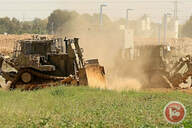
Several Israeli military vehicles raided Palestinian lands, on Monday, east of Beit Hanoun, in the northern besieged Gaza Strip.
A Ma'an reporter said that six large D-9 Israeli military bulldozers entered dozens of meters into Palestinian lands, east of Beit Hanoun.
Sources added that Israeli military bulldozers razed and leveled the lands while drones flew overhead.
Israeli military incursions inside the besieged Gaza Strip and near the "buffer zone," which lies on both land and sea sides of Gaza, have long been a near-daily occurrence.
The Israeli army also regularly detains and opens fire on unarmed Palestinian fishermen, shepherds, and farmers along the border areas if they approach the buffer zone, as the authorities have not made clear the precise area of the designated zone.
The practice has in effect destroyed much of the agricultural and fishing sector of the blockaded coastal enclave, which has been under an Israeli air, land and sea blockade for 12 years.
A Ma'an reporter said that six large D-9 Israeli military bulldozers entered dozens of meters into Palestinian lands, east of Beit Hanoun.
Sources added that Israeli military bulldozers razed and leveled the lands while drones flew overhead.
Israeli military incursions inside the besieged Gaza Strip and near the "buffer zone," which lies on both land and sea sides of Gaza, have long been a near-daily occurrence.
The Israeli army also regularly detains and opens fire on unarmed Palestinian fishermen, shepherds, and farmers along the border areas if they approach the buffer zone, as the authorities have not made clear the precise area of the designated zone.
The practice has in effect destroyed much of the agricultural and fishing sector of the blockaded coastal enclave, which has been under an Israeli air, land and sea blockade for 12 years.
11 may 2019
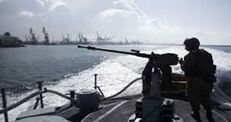
The Israeli occupation navy on Saturday arrested three Palestinian fishermen off the shore of the besieged Gaza Strip.
Zakariya Baker, a Palestinian official in charge of documenting Israeli attacks on Gaza fishermen, said that Israeli gunboats heavily opened fire at fishing boats west of Gaza city and detained three fishermen.
Baker said that the Israeli navy arrested the three brothers Emran, Mansour, and Atef Baker, seized their boat, and transferred them to an undeclared destination.
On Friday, the Israeli authorities allowed Gaza fishermen to resume fishing after a week-long ban in the wake of the latest military assault on the seaside area and expanded the permitted fishing zone to 12 nautical miles.
The Israeli naval forces on almost a daily basis chase Palestinian fishermen in Gaza, shoot at them, arrest them, or confiscate their boats and fishing equipment in violation of the agreement signed between Israel and Palestinian resistance factions following the 2014 war.
Zakariya Baker, a Palestinian official in charge of documenting Israeli attacks on Gaza fishermen, said that Israeli gunboats heavily opened fire at fishing boats west of Gaza city and detained three fishermen.
Baker said that the Israeli navy arrested the three brothers Emran, Mansour, and Atef Baker, seized their boat, and transferred them to an undeclared destination.
On Friday, the Israeli authorities allowed Gaza fishermen to resume fishing after a week-long ban in the wake of the latest military assault on the seaside area and expanded the permitted fishing zone to 12 nautical miles.
The Israeli naval forces on almost a daily basis chase Palestinian fishermen in Gaza, shoot at them, arrest them, or confiscate their boats and fishing equipment in violation of the agreement signed between Israel and Palestinian resistance factions following the 2014 war.
10 may 2019
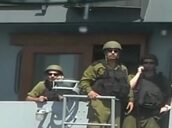
Israeli soldiers attacked, on Friday evening, several Palestinian fishing boats with live fire, in Gaza territorial waters, forcing the fishermen to return to the shore in fear of further violations.
Eyewitnesses said the navy ships attacked the fishing boats near the shore of the Sudaniyya area, northwest of Gaza city.
The attack is part of ongoing violations against the Palestinian fishermen, in addition to the farmers and workers on their lands near the perimeter fence across the eastern parts of the coastal region.
Eyewitnesses said the navy ships attacked the fishing boats near the shore of the Sudaniyya area, northwest of Gaza city.
The attack is part of ongoing violations against the Palestinian fishermen, in addition to the farmers and workers on their lands near the perimeter fence across the eastern parts of the coastal region.
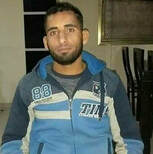
Abdullah Jom’a Abdul-‘Al, 24
Israeli soldiers attacked, Friday, the weekly Great Return March processions on Palestinian lands along the eastern areas of the Gaza Strip, killing one Palestinian and wounding 30, including four children, and one medic who was shot in the head.
The Palestinian Health Ministry in Gaza has confirmed that the soldiers killed Abdullah Jom’a Abdul-‘Al, 24, east of Rafah, in the southern part of the Gaza Strip.
It added that the soldiers also injured thirty Palestinians, including four children, and a volunteer medic, who suffered a head injury while providing treatment to wounded Palestinians.
The medic, identified as Mohammad Abu T’eima, was shot as he, and several other medics were providing treatment to wounded protesters, who were shot by the soldiers on Palestinian lands, east of Khan Younis, in the southern part of the coastal region.
Eyewitnesses said the soldiers resorted to the excessive use of force against the protesters by firing a barrage of live rounds, rubber-coated steel bullets and high-velocity gas bombs at them.
Israeli soldiers attacked, Friday, the weekly Great Return March processions on Palestinian lands along the eastern areas of the Gaza Strip, killing one Palestinian and wounding 30, including four children, and one medic who was shot in the head.
The Palestinian Health Ministry in Gaza has confirmed that the soldiers killed Abdullah Jom’a Abdul-‘Al, 24, east of Rafah, in the southern part of the Gaza Strip.
It added that the soldiers also injured thirty Palestinians, including four children, and a volunteer medic, who suffered a head injury while providing treatment to wounded Palestinians.
The medic, identified as Mohammad Abu T’eima, was shot as he, and several other medics were providing treatment to wounded protesters, who were shot by the soldiers on Palestinian lands, east of Khan Younis, in the southern part of the coastal region.
Eyewitnesses said the soldiers resorted to the excessive use of force against the protesters by firing a barrage of live rounds, rubber-coated steel bullets and high-velocity gas bombs at them.
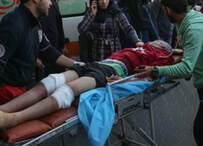
Israeli soldiers shot, on Friday morning, a Palestinian farmer while working on his own land, east of Gaza city.
Eyewitnesses said the soldiers, stationed across the perimeter fence, fired many live rounds at Palestinian farmers, wounding one of them.
Palestinian Red Crescent medics rushed to the area, and moved the wounded man to the Shifa Medical Center, west of Gaza city.
The attack is part of ongoing violations against the farmers and workers along the eastern parts of the Gaza Strip, in addition to the frequent assaults against the fishermen in Palestinian territorial waters.
Eyewitnesses said the soldiers, stationed across the perimeter fence, fired many live rounds at Palestinian farmers, wounding one of them.
Palestinian Red Crescent medics rushed to the area, and moved the wounded man to the Shifa Medical Center, west of Gaza city.
The attack is part of ongoing violations against the farmers and workers along the eastern parts of the Gaza Strip, in addition to the frequent assaults against the fishermen in Palestinian territorial waters.
Page: 24 - 23 - 22 - 21 - 20 - 19 - 18 - 17 - 16 - 15 - 14 - 13 - 12 - 11 - 10 - 9 - 8 - 7 - 6 - 5 - 4 - 3
Truce violations List of names Pictures of martyrs
Days: Aug: 26 - 25 - 24 - 23 - 22 - 21 - 20 - 19 - 18 - 17 - 16 - 15 - 14 - 13 - 12 - 11 - 10 - 9 - 8 - 7 - 6 - 5 - 4 - 3 - 2 - 1
July: 31 - 30 - 29 - 28 - 27 - 26 - 25 - 24 - 23 - 22 - 21 - 20 - 19 - 18 - 17 - 16 - 15 - 14 - 13 - 12 - 11 - 10 - 9 - 8
